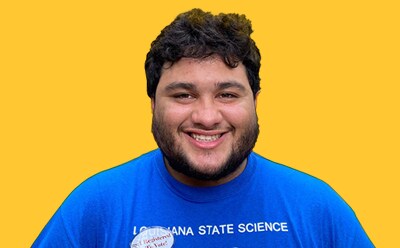Pedro Jimenez Antenucci: My Next Great Impossible

Pedro Jimenez Antenucci is a Chemistry Ph.D. student at the University of Pennsylvania. He talked to us about the importance of developing the next generation of HNacNac ligands in the field of green chemistry during his undergraduate studies prior to graduate school.
With an emphasis on green chemistry, my undergraduate work at Southeastern Louisiana University focused on developing a library of green tri- and tetradentate β-diketiminate molecules that could translate to the next generation of HNacNac ligands. Conducted pre-pandemic, this will transition to another student to continue the attempt to optimize current methods and install these ligands onto transition metals for future tunable catalysis such as olefin polymerization.
“…we ultimately looked into investigating new cost-effective synthetic methodologies for the β-diketiminate class of ligands.”
Under Dr. Benjamin Wicker, assistant professor at SELU, relocating to Eastern Kentucky University this Fall 2022, we looked into investigating new cost-effective synthetic methodologies for the β-diketiminate class of ligands. The traditional ligand is a monoanionic, bidentate ligand, HNacNac, which can accommodate most metals and geometries and are robust ligand frameworks. Herbert Roesky’s synthesis towards tetradentate scaffolds utilized a three-step path that required a dry-box method, as well as the expensive and difficult to synthesize Merwein’s salt. The use of this reagent limits their application and research in laboratories. Being a new research group at a primarily undergraduate institution, we sought to avoid harmful environmental reagents, as well as developing a modular synthetic method for this class of ligands.
“My lab group members inspire me every day…”
My lab group members inspire me every day because, as a group, we push each other by providing necessary feedback to continue growing as young researchers. For instance, senior graduate students are there and readily available to pass on knowledge to starting first-year students like me. Because of this, the feedback mechanisms will push me to think about my future ideas related to my Next Great Impossible through my current project. Since joining Professor Marisa Kozlowski’s group at Penn earlier this year, I will be looking into investigating regioselective methodologies towards C–H Functionalization of aromatic heterocycles. Development and investigation of functionalization of complex heterocycles can be useful for significant methods in pharmaceutical applications such as the drug discovery process. At a future conference, I would be interested to share my efforts towards my new Next Great Impossible and elaborate more on our efforts in this project.
FAQ
Q: What kind of mindset do you need to achieve the Next Great Impossible?
A: Resilience, perseverance, dedication, and pride in representing the Latin American community.
Para continuar lendo, faça login ou crie uma conta.
Ainda não tem uma conta?